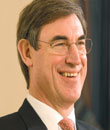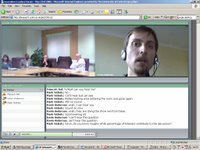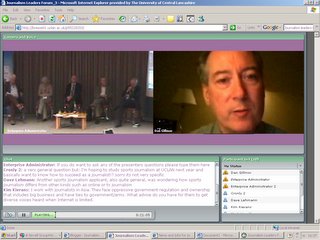But this summer's surprise announcement that Old Media News Corporation was shacking up with New Social Network Media MySpace, indicates that even in the most conservative of circles, the apparent taboo of old and new media nuptials is over.
Since then, the 'oldies' have been scrambling to woo young digital operators, in general, and social network companies, in particular. CBS has embraced YouTube (who is, by the way, a partner of Verizon who has, in turn, already hooked up with MTV, ESPN, and ABC News) and the 160-year-old Reuters has tied the knot with 12-year-old Yahoo, who is also linked to baby-faced Flickr.
Of course, not every date has led to the altar: today NTL and ITV formally announced their much-discussed union was not to be.
So, where is this going? Are there any tips to help these relationships flourish? What does it all mean for journalism?
 Those are some key issues under the spotlight at the 5th Journalism Leaders Forum coming up at the University of Central Lancashire in February 2007. Paris-based advertising and brand specialist Mark Tungate (left) will chair the discussion of cases and issues entitled: "Media Mashups! How Traditional Media Brands Survive and Thrive in a Widely Wired World". Media convergence expert Jane Singer, the newly-appointed Johnston Press Chair in Digital Journalism at UCLan, and Heather Hopkins, Hitwise vice president for research, will be amongst the panellists.
Those are some key issues under the spotlight at the 5th Journalism Leaders Forum coming up at the University of Central Lancashire in February 2007. Paris-based advertising and brand specialist Mark Tungate (left) will chair the discussion of cases and issues entitled: "Media Mashups! How Traditional Media Brands Survive and Thrive in a Widely Wired World". Media convergence expert Jane Singer, the newly-appointed Johnston Press Chair in Digital Journalism at UCLan, and Heather Hopkins, Hitwise vice president for research, will be amongst the panellists.The event, which forms part of the Winter residential week programme for participants in the Department of Journalism's Journalism Leaders Programme, is open to all - practitioners, academics, would-be journalists and others who are interested in the challenges of leading journalism in a digital age.
To attend this free programme at 6pm on Tuesday, February 6th, in Greenbank Lecture Theatre in Preston - as well as the network reception from 5:30pm - please RSVP to leaders@ukjournalism.org.
- NOTE: Applications are currently being accepted for the Winter seminars, which will include sessions by Hopkins, Singer and Tungate, as well as other accomplished practitioners and academics: Journalism and the Market: Understanding Users, Delivering Value and Principles of Journalism Leadership: Strategy for the Digital Age. Please see the Programme website or email the director François Nel for more information.







